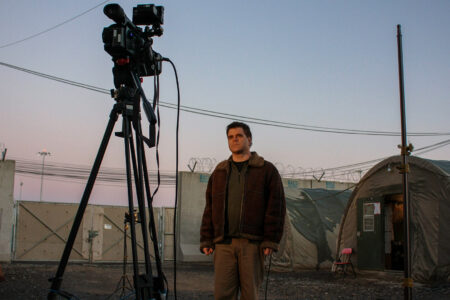
As journalism education goes, so goes journalism.
That is not to say that journalism schools necessarily produce the best journalists, or that collectively, journalism degree holders necessarily produce the best journalism. But writing about the relationship between democracy and journalism, Columbia University journalism professor Michael Schudson noted, “journalism does not produce democracy where democracy does not exist, but it can do more to help democracies thrive”; in other words, journalism education has a continuing and important role to play in the health of journalism into the future.
Then-CBC reporter Terry Milewski put it a little more colourfully in 2009, when he addressed students at the University of Regina’s School of Journalism. “All I can tell you is that you’d better try, and you’d better succeed,” he warned them. “Or the loony bloggers and the celebrity recipes will be all we have.”
In the seven years since then, we have had so much more than that.
Fake news, alternative facts and notable cases of journalistic plagiarism. Newspaper closures, newsroom downsizings, layoffs and buyouts. Uncertainty and chaos that has, at the very least, precipitated urgent and focused civic introspection about the value and viability of journalism. This is best exemplified in Canada by the study into the state of the news media conducted by the Public Policy Forum, at the federal government’s behest, and the Commons committee study of local news. In the US, the 2016 election campaign and results highlighted the long-simmering anxiety about journalism’s future.
Strategically, journalism schools are in a unique position to support journalism’s mission — to seek the truth, to inform, to enlighten — in the years to come. But that can only happen if they can provide the type of journalism education and education about journalism that is relevant and aligned with 21st century realities.
There has been no end of discussion, in both countries, about the nature and scope of that realignment. The Knight Foundation’s 2015 report Above & Beyond: Looking at the Future of Journalism Education called for a new model of journalism school that would operate like a digital start-up. Unfettered by the traditional strictures of the academy, going their own way with staffing and scheduling, such schools would be free to be “intentionally disruptive and hyper-professional.” Harvard University’s Neiman Foundation for Journalism published How To Make J-School Matter (Again): A blueprint for the future of journalism education, which mapped out three specific pedagogical focal points: a distinct slate of general studies courses, from probability and statistics to cultural anthropology; an updated set of core journalism courses; and immersive learning, in the form of full-time co-ops in school-based digital newsrooms, that are geared to community news. According to the report’s author, Amy Webb, “all of journalism” [emphasis added] — not just the schools — would gain from such an overhaul.
Similarly, in Canada, at a 2014 Ryerson University conference about journalism education, the dominant theme was the need for swift and drastic change. To teach more thoughtfully. To teach more innovatively. To contemplate, for example, a “paradigm shift” in education, based on the premise that “journalism is an approach to knowledge, not just a job.”
“It is not a matter of thinking outside the box, because the box no longer exists,” media specialist Robert G. Picard told the conference. “What is required is deciding what will replace the box or how to get along without one.” In fact, journalism educators had been grappling with their boxless predicament for some time before he uttered those words. According to survey research I collected with journalism professors Mary McGuire and Janice Neil, many Canadian journalism programs (including Carleton’s program, which I head) were operating in a state of constant change, and had been doing so for at least five years prior to the 2015 survey. They had added, to varying degrees, the sorts of curricular elements expected of any forward-thinking journalism school: data, social media, entrepreneurship, podcasting, coding, blogging, photography.
With that came the recognition that a more nuanced understanding of journalism’s role is essential for students into the future, and that acquiring a scholarly education and specialized knowledge beyond professional skills is crucial. Journalism schools can help inject new energy into tomorrow’s journalism, with storytelling innovations that are developed, debated and practiced in the classroom before being pushed out into the community. What does this mean in practical terms? At Carleton — where professional development and academic studies have always been paired — it means reconstructing our journalism curriculum around a digital hub focused on local stories such as this one, and involving students from all levels of the program in our efforts to find new ways of engaging with the community we serve.
But the health of journalism education hinges on more than developing new pedagogical approaches. Softening demand for journalism programs in the US is exemplified by cuts at the prestigious Columbia School of Journalism. In Canada, a similar softening can be seen in both graduate and undergraduate application numbers in Ontario: it is safe to assume this pattern holds true across the country. To secure a viable space for the education of journalists in future, there must be greater recognition of the linkage between journalism education and journalism—not the journalism industry per se, but journalism and its role in society. There is no better time than now to dive more deeply into that discussion. Still, any conversation must acknowledge that the pressures facing journalism schools are not simply external.
In their 2001 analysis of journalism education, Peter Johansen, David H. Weaver and Christopher Dornan noted that its problems had not changed in the previous century, but had “merely become more pointed and more expensive.” That statement still holds, especially with respect to internal institutional challenges related to resources and the perceived value of the degree, and 21st century developments will sharpen those points of contention.
Ultimately, universities that are committed to the long-term viability of journalism education, and by extension journalism itself, must be prepared to remain invested in programs long regarded in some quarters as being excessively costly professional training grounds, never wholly embraced by the academy. Connected to that, journalism faculties must be revitalized, as has always been the case; however, now more than ever, programs must infuse themselves with an innovative breed of thinkers and storytellers if they truly want to build upon current pedagogical change and demonstrate the value of a journalism education. The programs that survive and thrive will be those with the latitude to experiment and sometimes fall short, to stoke research-based expertise that focuses on new forms of journalism, to move swiftly to the new while doubling down on the teaching of journalism’s core values and skills.
So far, nobody has developed a solution or set of solutions that will uniformly make journalism matter (again), and matter in ways that will set news organizations on a profitable path. We are still on the cusp, still at a point of experimentation; in any case, uniformity is highly unlikely and not a desirable outcome for either journalism or journalism schools.
Even in the face of uncertainty, there will be a tangible return to investing in journalism education. Young people who receive professional training and develop academic depth will have the means to understand the importance of and actively participate in reshaping the conversation about journalism and its practice. Whether they do that from within the profession or as media-literate citizens actively engaged in information exchanges and storytelling that resonates within their communities, all of us (to echo Amy Webb) stand to gain.
This article is part of the special feature The Future of Canadian Journalism.
Photo: Shutterstock.com
Do you have something to say about the article you just read? Be part of the Policy Options discussion, and send in your own submission. Here is a link on how to do it. | Souhaitez-vous réagir à cet article ? Joignez-vous aux débats d’Options politiques et soumettez-nous votre texte en suivant ces directives.






